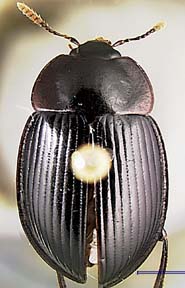
Additional images: face view (click here), ventral view (click here).
Range:
The Pacific coast states, and a few occurances in Indiana and Kentucky (Borror, et al. 1989).
Identification:
4mm- 14mm long. Form oblong to elongate in shape, slightly flattened, slightly convex. The body is blackish, soft, smooth, hairless and without punctures or structures. This is a small group of only 6 North American species. This family was once included with the Silphidae (Carrion beetles).
The elytra are usually with 9 striae (longitudinal ridges) each, covering all or nearly all of the abdominal segments.
The abdomen is with 6 visible abdominal sterna in the males, and 5 in the females.
The head is prominant and easily seen from above. The antennae are symmetrically clavate (clubbed), and the 7th segment is nearly rounded. The maxillary palps are much shorter than the antennae.
The front coxae are conical or quadrate (squared). The tarsal formula is 5-5-5.
The larval occeli are absent.
Natural History:
Habitat includes dead or decaying vegetable and animal matter.
Literature Cited:
Borror, D. J., Triplehorn, C. A., and Johnson, N. F. 1989. An Introduction to the Study of Insects, 6th Edition. New York, Saunders College Publishing.